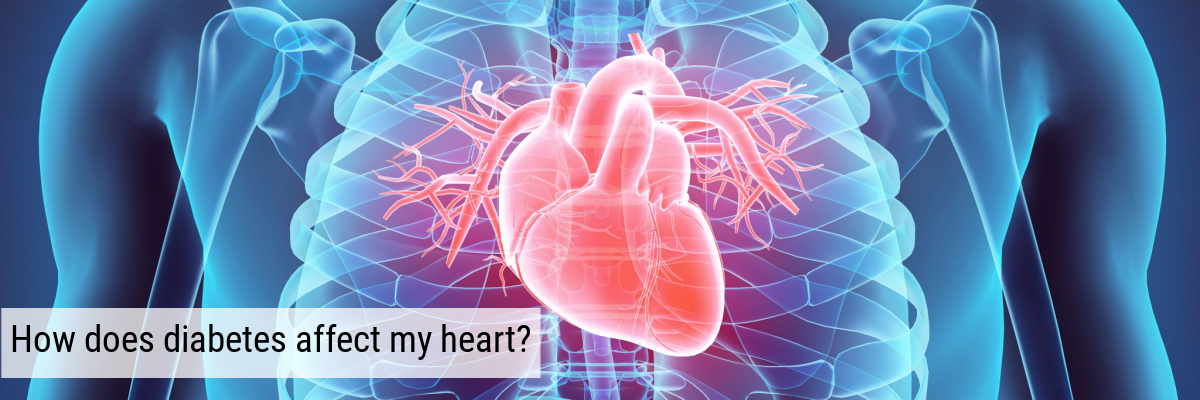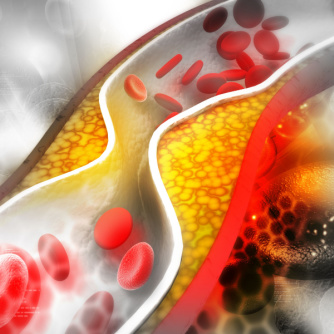How does diabetes affect my heart?

People with diabetes are 2 to 3 times more likely to have a heart attack or stroke than someone without diabetes. They are also more likely to experience problems at a younger age than those living without diabetes.
This is due to damage that affects the arteries moving blood between the heart and brain.
If these blood vessels get damaged or blocked, this can cause serious cardiovascular problems affecting the heart (e.g. a heart attack, angina or heart failure) or the brain (e.g. a stroke, mini-stroke or dementia).
Three risk factors for developing blood vessel problems are:
- High glucose
- High blood pressure
- High cholesterol (lipids)
- Genetics – strong family history
- Ethnicity – higher risk group include Asian/Arabic/African origin
- Sex – men at greater risk than women
- Obesity
- Lifestyle – activity, smoking, alcohol and dietary factors
Blood pressure
Blood pressure is the pressure that circulating blood exerts on the inside walls of the blood vessels. A number of factors can affect blood pressure such as how well your heart is pumping your blood and how elastic the walls of your blood vessels are to allow the blood to flow through them.
A blood pressure reading is given as two figures. The first is called the systolic reading, which is the pressure as the heart pumps blood into the artery.
The second is called the diastolic reading, which is the pressure as the heart relaxes.

Most people with diabetes should ideally aim to have a blood pressure reading of around 140/80 mmHg or less. Sometimes lower targets are suggested for higher risk people.
Blood pressure can be increased if the walls of the blood vessels have become less elastic due to the furring or hardening of the arteries. This can be due to high blood glucose, high cholesterol, and/or smoking over a number of years.
There are a number of things that can help to reduce blood pressure. These include:
- stopping smoking if you smoke
- increasing your physical activity
- losing weight if you are overweight
- drinking less alcohol
- reducing the amount of salt in your diet
- reducing your caffeine intake
Sometimes blood pressure can go up if you are stressed, so thinking about some ways to help manage stress can be helpful.
A one-off high blood pressure reading doesn’t necessarily mean that you have high blood pressure. To make a diagnosis of high blood pressure (hypertension), you will be asked to see your healthcare professional on more than one occasion or you may be asked to measure your blood pressure at home over a period of time.
If you and your healthcare professional decide that medication is required to reduce your blood pressure, taking this medication regularly will reduce your risk of developing diabetes complications.
Cholesterol
Cholesterol is a fatty substance found in your blood and is produced naturally in the liver. Everyone has cholesterol in their body and we need it to stay healthy because every cell in our body uses it. Some of this cholesterol comes from the food we eat. There are two types of cholesterol; LDL and HDL.
Low-density lipoprotein (LDL)
LDL carries cholesterol from your liver to the cells. If there is too much, it can build up in the artery walls, clogging your blood vessels and causing high blood pressure. For this reason, LDL cholesterol is known as ‘bad cholesterol’.
High-density lipoprotein (HDL)
HDL carries cholesterol away from the cells and back to the liver, where it is passed out of the body as a waste product. For this reason, it is referred to as ‘good cholesterol’ and higher levels are better.
The target for total cholesterol for most people with diabetes is less than 4 mmol/L. The amount will be measured when you get your blood taken at your diabetes clinic

If your cholesterol is high you should think about your diet and cut down on foods high in saturated fat such as red and processed meat, pastries, cheese, butter, lard and other dairy products. It’s also a good idea to try and limit deep-fried foods.
Statins are a type of medicine that lower your cholesterol level and therefore reduces your risk of heart disease and stroke. Although most people with type 2 diabetes should be offered a statin, your doctor will calculate your personal risk of heart disease and then talk to you about whether you should be on a statin.
Although the best evidence supports the use of statins, if you cannot tolerate them or your cholesterol is not to target, your diabetes team will be able to suggest additional or alternative treatments. These may be in the form of tablets or injections.
The commonest tablet alternative to statins are Ezetimibe and Bempedoic acid.
There are 2 forms of injectable treatment; Evolocumab (Repatha) and Alirocumab (Praluent) are injections that you give yourself every 2 or 4 weeks using a device that is very similar to an insulin pen. Inclisiran is an injection every 6 months, usually given at your GP surgery.
In some areas you would need to see a cholesterol specialist before you can receive Bempedoic acid or the injectable treatments.



Leave a Reply
You must be logged in to post a comment.